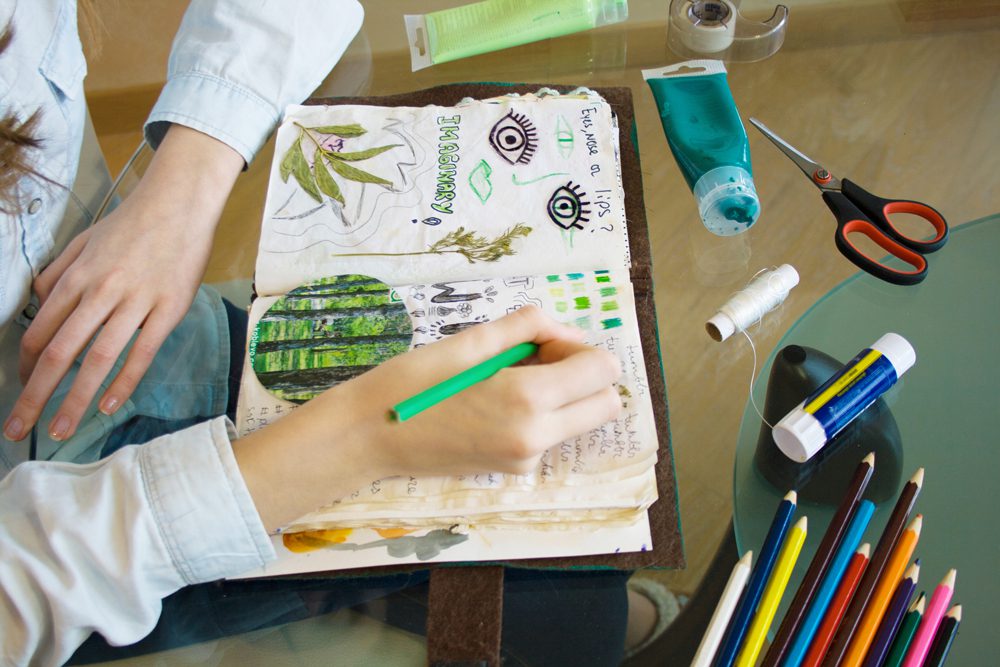In previous blog posts—like this one—we have suggested that keeping a journal can be a useful activity for a person in recovery from a substance use disorder. We have even provided some prompts to get you started.
We continue to believe that journals—whether it is a gratitude journal; a journal for tracking your progress with things like exercise, sleep, and nutrition; a journal where you record your thoughts and feelings each day; or another type of journal—can be extremely helpful for a person who is working to maintain their recovery.
Even in the blog post we linked to at the very beginning of this entry, we acknowledged that not everyone is going to be excited about a traditional approach to journaling:
Don’t like to write? Fair enough. An art journal might be for you. Drawing, doodling, making collages, and the like can still offer insights and provide motivation as you work to stay engaged and to fend off relapse. If you have an artistic soul, this may be a great direction for your journaling efforts.
In this post, we are going to build on the idea that your journal does not have to be filled with writing. Let’s start with what we just mentioned: drawing, doodling, and making collages.
The Art Journal
Some people’s thoughts are made up of words. For other people, however, thoughts more often pop up as images. For still others, the process of thinking may involve words and images in different combinations. Similarly, people experience emotions differently—and for some images can be a big part of their emotional journey.
If you find that you connect images with thoughts and feelings, an art journal can be a great way to explore what you are experiencing. Rather than writing words, you can fill your journal with artwork of one kind or another. Whether you doodle with a pencil or pen, make something colorful with crayons or paint, or create collages from whatever is handy, you can use the process as a way to process thoughts and emotions. Or you can use artistic endeavor simply as a way to relax, recharge, and set aside some of your daily stress.
The Photo Journal
Not all that long ago, lots and lots of people had lots and lots of unorganized photos sitting in shoeboxes. Heck, sometimes those boxes also held undeveloped rolls of film or loose negatives. These days, of course, we have just as many photos—probably even more photos—residing in an unorganized collection on our phones.
All of these photographs could be the source of wonderful journaling material. Maybe you pick a photo each day and write a caption that goes with it—either a description of who and what is in the photo or a quick note about how that particular image makes you feel. You could also find photos that seem to represent a theme or an emotion and place them together in an album, whether physical or digital. Photographs are extremely evocative and can be a way to explore emotions, thoughts, and themes that you might return to again and again.
The Souvenir Journal
Just as many of us have unsorted collections of photographs, lots of people also have a range of souvenirs from different moments in their lives. Maybe you have a torn ticket from going to a concert on a first date. Maybe you have some postcards from a series of vacations you have taken over the years. Maybe you have notes or letters from loved ones that you have kept over the years.
These memory objects can spark all sorts of reminiscences and feelings. Bringing them together in a more organized way is like making a journal of those memories so that you can more easily enjoy them and remember times that have been important to you. As with photos, you can write down what these souvenirs bring to mind, or you can simply reflect on each as you hold and examine it.
There Is Really No Wrong Way to Journal
Our hope is that we have expanded the ways you might think about journaling as an activity that supports your mental wellbeing and your ongoing recovery. Even if none of the options we have mentioned seem quite right for you, they might serve as a jumping off point for something you would enjoy that would serve you well. Finding an engaging, gentle way to reflect on thoughts and feelings is an excellent practice in recovery.
We Are Ready to Help
At Bel Aire Recovery Center—located near Wichita, Kansas—we help individuals put drug or alcohol use behind them. We are committed to providing personalized care that is grounded in evidence-based practice and offered from a place of expertise, experience, and empathy.
If you are struggling with a substance use disorder, we can help. If your substance use disorder is entangled with a co-occurring mental health disorder like depression, anxiety, or a trauma-centric issue, we can help. If you are ready to begin your life-changing transformation, we can help.




